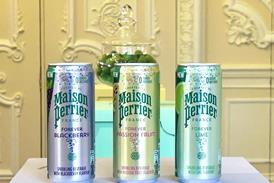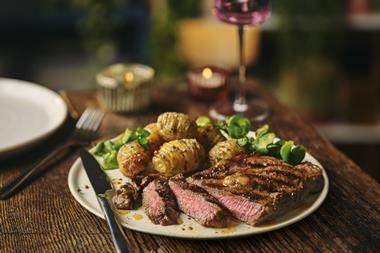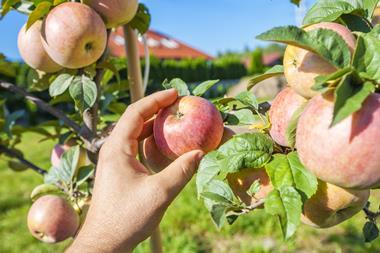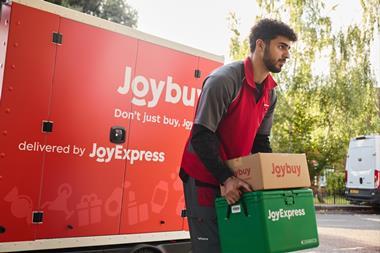The UK creates some 5.2 million tonnes of packaging waste each year. But even worse is the six million tonnes of food left out for bin men.
Packs that prolong shelf life can have a huge impact in reducing the amount of food wasted each day, either because it has exceeded its best-before date or is no longer fit for consumption.
The industry needs to change consumer perceptions that food waste is less important than packaging waste, argues a new report from the Waste and Resources Action Programme.
It says the UK industry must follow its European neighbours by embracing technology that extends shelf life without creating more waste.
"We've got a huge challenge to educate consumers to become more aware of food waste," says WRAP adviser Mark Barthel. "Because food is natural consumers don't have a problem with sticking it in the ground, but they don't consider the methane it produces - or the carbon used to make food."
However, with consumers increasingly aware of packaging waste, any shelf life-prolonging innovations can't be perceived to be at the expense of adding more unnecessary packaging, adds Barthel. "There is a balancing act in how packaging is used to reduce waste and how much material is used."
Suppliers and retailers already use plenty of shelf-life prolonging technologies, but not all are well received by shoppers. Retailers now wrap short shelf-life products, such as croissants, individually. This helps to reduce food waste, but many consumers perceive it to be excessive packaging. "If one in 10 of these packs stops food going to waste it will save more than the packaging used. Consumers need to understand this," says Barthel.
Consumers respond well to resealable cheese packs, such as Cathedral City's, but similar packs for grapes are considered wasteful. Likewise, consumers regard sharing pots for cakes and snack foods, such as cocktail sausages, and individual portion packs of Philadelphia Cheese as a waste. Adds Barthel: "That is the point where consumers step back and do not buy it."
While resealable packaging is creeping on to shelves (regardless of consumer concerns) UK retailers have been slower to adopt some incredible technologies that are being used in Europe and the US.
Emerging technology includes the Traceo freshness indicator. It sits on top of fresh food barcodes, making them impossible to scan once the food is no longer fit for consumption. Time and temperature indicators (TTI) change colour through chemical reactions, while ripeness indicators for fruit and veg show the optimum time to consume them.
In Europe, the main user of TTI labels is French supermarket chain Monoprix where they are on nearly 200 products. In the US, Ripesense indicators are used to help consumers judge the ripeness of fruits such as avocados and pears.
Barthel says UK retailers haven't adopted these innovations because of the perceived costs and consumers not fully understanding the technology, but are missing out on benefits other than just helping the environment. "Prices for these innovations are coming down and there is huge retailer benefit. You can manage your inventory much more efficiently and get real- time analysis of the condition of food as it goes through the chain."
French consumers regard TTI labelling as a more reliable guide than 'use by' dates, says Barthel, and are prepared to pay more for the reassurance of freshness and quality. "TTI is a big opportunity to remove confusion over the lifespan of foods and there is no reason why UK consumers won't embrace it."
The challenge is to educate people that when it comes to packaging, more really can mean less.n
Packs that prolong shelf life can have a huge impact in reducing the amount of food wasted each day, either because it has exceeded its best-before date or is no longer fit for consumption.
The industry needs to change consumer perceptions that food waste is less important than packaging waste, argues a new report from the Waste and Resources Action Programme.
It says the UK industry must follow its European neighbours by embracing technology that extends shelf life without creating more waste.
"We've got a huge challenge to educate consumers to become more aware of food waste," says WRAP adviser Mark Barthel. "Because food is natural consumers don't have a problem with sticking it in the ground, but they don't consider the methane it produces - or the carbon used to make food."
However, with consumers increasingly aware of packaging waste, any shelf life-prolonging innovations can't be perceived to be at the expense of adding more unnecessary packaging, adds Barthel. "There is a balancing act in how packaging is used to reduce waste and how much material is used."
Suppliers and retailers already use plenty of shelf-life prolonging technologies, but not all are well received by shoppers. Retailers now wrap short shelf-life products, such as croissants, individually. This helps to reduce food waste, but many consumers perceive it to be excessive packaging. "If one in 10 of these packs stops food going to waste it will save more than the packaging used. Consumers need to understand this," says Barthel.
Consumers respond well to resealable cheese packs, such as Cathedral City's, but similar packs for grapes are considered wasteful. Likewise, consumers regard sharing pots for cakes and snack foods, such as cocktail sausages, and individual portion packs of Philadelphia Cheese as a waste. Adds Barthel: "That is the point where consumers step back and do not buy it."
While resealable packaging is creeping on to shelves (regardless of consumer concerns) UK retailers have been slower to adopt some incredible technologies that are being used in Europe and the US.
Emerging technology includes the Traceo freshness indicator. It sits on top of fresh food barcodes, making them impossible to scan once the food is no longer fit for consumption. Time and temperature indicators (TTI) change colour through chemical reactions, while ripeness indicators for fruit and veg show the optimum time to consume them.
In Europe, the main user of TTI labels is French supermarket chain Monoprix where they are on nearly 200 products. In the US, Ripesense indicators are used to help consumers judge the ripeness of fruits such as avocados and pears.
Barthel says UK retailers haven't adopted these innovations because of the perceived costs and consumers not fully understanding the technology, but are missing out on benefits other than just helping the environment. "Prices for these innovations are coming down and there is huge retailer benefit. You can manage your inventory much more efficiently and get real- time analysis of the condition of food as it goes through the chain."
French consumers regard TTI labelling as a more reliable guide than 'use by' dates, says Barthel, and are prepared to pay more for the reassurance of freshness and quality. "TTI is a big opportunity to remove confusion over the lifespan of foods and there is no reason why UK consumers won't embrace it."
The challenge is to educate people that when it comes to packaging, more really can mean less.n

















No comments yet